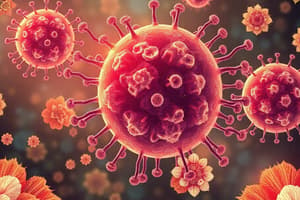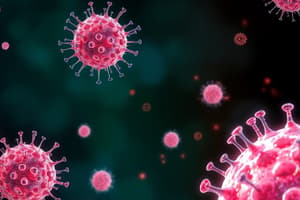Podcast
Questions and Answers
Which of the following best describes innate defenses in the immune system?
Which of the following best describes innate defenses in the immune system?
- Defenses that include physical barriers like skin and mucous membranes.
- Defenses that specifically target particular pathogens.
- Nonspecific defenses that act against any type of pathogen. (correct)
- Defenses involving antibodies and T cells.
What is the primary function of surface membrane barriers in the immune system?
What is the primary function of surface membrane barriers in the immune system?
- To prevent the entry of pathogens into the body. (correct)
- To produce antibodies against specific pathogens.
- To regulate the body's temperature during infection.
- To recognize and destroy infected cells.
Which internal defense mechanism is responsible for engulfing and destroying pathogens?
Which internal defense mechanism is responsible for engulfing and destroying pathogens?
- Natural killer (NK) cells
- Antimicrobial proteins
- Inflammation
- Phagocytes (correct)
What is the role of fever in the immune system's internal defenses?
What is the role of fever in the immune system's internal defenses?
Which type of immunity is characterized by the production of antibodies by B cells?
Which type of immunity is characterized by the production of antibodies by B cells?
What distinguishes adaptive defenses from innate defenses in the immune system?
What distinguishes adaptive defenses from innate defenses in the immune system?
Which type of immunity involves the production of antibodies by B cells upon encountering antigens?
Which type of immunity involves the production of antibodies by B cells upon encountering antigens?
What is the fate of most clone cells in clonal selection during the humoral immune response?
What is the fate of most clone cells in clonal selection during the humoral immune response?
Which antibody class is the most abundant and diverse, crosses the placenta, and confers passive immunity?
Which antibody class is the most abundant and diverse, crosses the placenta, and confers passive immunity?
What is the function of IgE antibodies?
What is the function of IgE antibodies?
In which type of immunity does immunological memory not occur?
In which type of immunity does immunological memory not occur?
What is the primary function of antibodies?
What is the primary function of antibodies?
What is the main function of the C region in antibodies?
What is the main function of the C region in antibodies?
Which mechanism is used by antibodies against cellular antigens?
Which mechanism is used by antibodies against cellular antigens?
What is the role of monoclonal antibodies in commercial use?
What is the role of monoclonal antibodies in commercial use?
Which cells are primarily helper T cells?
Which cells are primarily helper T cells?
What type of antigens are recognized by Class I MHC proteins?
What type of antigens are recognized by Class I MHC proteins?
Where are Class II MHC proteins found?
Where are Class II MHC proteins found?
Which type of immunity includes humoral and cellular immunity?
Which type of immunity includes humoral and cellular immunity?
What triggers the inflammatory response?
What triggers the inflammatory response?
Which of the following is NOT an internal defense mechanism?
Which of the following is NOT an internal defense mechanism?
What do interferons do?
What do interferons do?
What do complement proteins do?
What do complement proteins do?
What is the body's response to invading microorganisms?
What is the body's response to invading microorganisms?
Which cytokine is a key growth factor encouraging activated T cells to divide and is used therapeutically to enhance the body's defenses against cancer?
Which cytokine is a key growth factor encouraging activated T cells to divide and is used therapeutically to enhance the body's defenses against cancer?
Which type of T cells directly attack and kill virus-infected cells, cancer cells, and foreign cells from transplants?
Which type of T cells directly attack and kill virus-infected cells, cancer cells, and foreign cells from transplants?
What is the role of helper T cells in the immune response?
What is the role of helper T cells in the immune response?
What happens to T cells without co-stimulation?
What happens to T cells without co-stimulation?
Which cytokines are co-stimulators of T cells and key mediators in cellular immunity?
Which cytokines are co-stimulators of T cells and key mediators in cellular immunity?
What do suppressor T cells release cytokines for?
What do suppressor T cells release cytokines for?
What is the difference between specific and non-specific immunity?
What is the difference between specific and non-specific immunity?
Antibodies produced by plasma cells in response to an antigen challenge can bind to free antigens and mark them for destruction by specific or nonspecific mechanisms.
Antibodies produced by plasma cells in response to an antigen challenge can bind to free antigens and mark them for destruction by specific or nonspecific mechanisms.
The variable regions of heavy and light chains in an antibody combine to form the antigen-binding site.
The variable regions of heavy and light chains in an antibody combine to form the antigen-binding site.
Immunological memory occurs in both naturally acquired and artificially acquired passive humoral immunity.
Immunological memory occurs in both naturally acquired and artificially acquired passive humoral immunity.
Antibodies responding to different antigens have different V regions but the C region is the same for all antibodies in a given class.
Antibodies responding to different antigens have different V regions but the C region is the same for all antibodies in a given class.
Complement fixation is the main mechanism used against extracellular antigens.
Complement fixation is the main mechanism used against extracellular antigens.
Monoclonal antibodies are pure antibody preparations specific for a single antigenic determinant, and are used only to provide active immunity.
Monoclonal antibodies are pure antibody preparations specific for a single antigenic determinant, and are used only to provide active immunity.
Natural killer (NK) cells are part of the adaptive defense system
Natural killer (NK) cells are part of the adaptive defense system
Inflammatory response involves the shrinking of local blood vessels
Inflammatory response involves the shrinking of local blood vessels
Fever is always detrimental to the body's defense against invading microorganisms
Fever is always detrimental to the body's defense against invading microorganisms
Activated T cells enlarge, proliferate, differentiate, and perform functions based on their T cell class.
Activated T cells enlarge, proliferate, differentiate, and perform functions based on their T cell class.
IL-2, a key growth factor, encourages activated T cells to divide and is used therapeutically to enhance the body's defenses against cancer.
IL-2, a key growth factor, encourages activated T cells to divide and is used therapeutically to enhance the body's defenses against cancer.
Suppressor T cells release cytokines to suppress the activity of both T cells and B cells.
Suppressor T cells release cytokines to suppress the activity of both T cells and B cells.
Flashcards are hidden until you start studying
Study Notes
T Cell Activation and Immune Responses
- T cell activation requires recognition of co-stimulatory signals, such as B7 binding with the CD28 receptor.
- Without co-stimulation, T cells become tolerant to antigens, unable to divide, and do not secrete cytokines.
- Activated T cells enlarge, proliferate, differentiate, and perform functions based on their T cell class.
- Cytokines, including interleukin 1 and 2, are co-stimulators of T cells and key mediators in cellular immunity.
- IL-2, a key growth factor, encourages activated T cells to divide and is used therapeutically to enhance the body's defenses against cancer.
- Various cytokines, such as perforin, lymphotoxin, and gamma interferon, amplify and regulate immune responses.
- Helper T cells play a central role in the immune response by stimulating proliferation of other T cells and B cells.
- Helper T cells interact directly with B cells and release cytokines that amplify nonspecific defenses.
- Cytotoxic T cells directly attack and kill virus-infected cells, cancer cells, and foreign cells from transplants.
- Tc cells bind to self-antiself complexes on all body cells and destroy infected or abnormal cells in the presence of appropriate antigens and co-stimulatory stimuli.
- Suppressor T cells release cytokines to suppress the activity of both T cells and B cells.
- Different types of grafts and prevention of rejection, as well as immunodeficiencies such as SCID, Hodgkin's disease, and AIDS, are also discussed.
T Cell Activation and Immune Responses
- T cell activation requires recognition of co-stimulatory signals, such as B7 binding with the CD28 receptor.
- Without co-stimulation, T cells become tolerant to antigens, unable to divide, and do not secrete cytokines.
- Activated T cells enlarge, proliferate, differentiate, and perform functions based on their T cell class.
- Cytokines, including interleukin 1 and 2, are co-stimulators of T cells and key mediators in cellular immunity.
- IL-2, a key growth factor, encourages activated T cells to divide and is used therapeutically to enhance the body's defenses against cancer.
- Various cytokines, such as perforin, lymphotoxin, and gamma interferon, amplify and regulate immune responses.
- Helper T cells play a central role in the immune response by stimulating proliferation of other T cells and B cells.
- Helper T cells interact directly with B cells and release cytokines that amplify nonspecific defenses.
- Cytotoxic T cells directly attack and kill virus-infected cells, cancer cells, and foreign cells from transplants.
- Tc cells bind to self-antiself complexes on all body cells and destroy infected or abnormal cells in the presence of appropriate antigens and co-stimulatory stimuli.
- Suppressor T cells release cytokines to suppress the activity of both T cells and B cells.
- Different types of grafts and prevention of rejection, as well as immunodeficiencies such as SCID, Hodgkin's disease, and AIDS, are also discussed.
Studying That Suits You
Use AI to generate personalized quizzes and flashcards to suit your learning preferences.




![Lecture 06: T-cells and B-cell activation [MCQ 2]](https://assets.quizgecko.com/cdn-cgi/image/width=300,height=200,fit=crop,quality=75,format=webp/quiz/3a994686d8bf59d60d02fc2aa264f493.jpg)